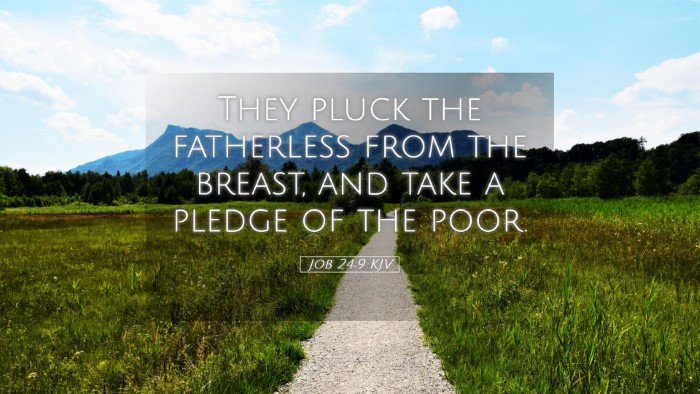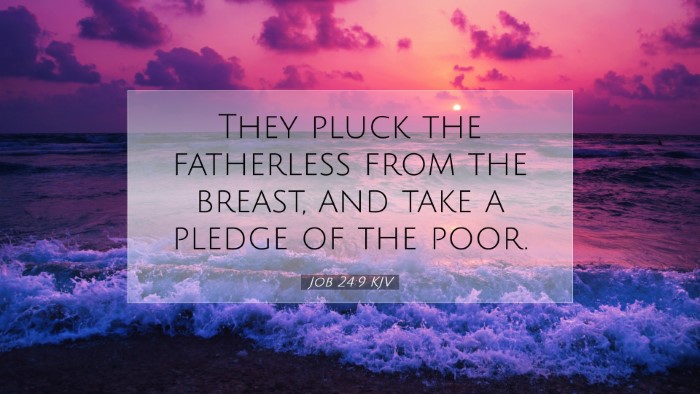Old Testament
Genesis Exodus Leviticus Numbers Deuteronomy Joshua Judges Ruth 1 Samuel 2 Samuel 1 Kings 2 Kings 1 Chronicles 2 Chronicles Ezra Nehemiah Esther Job Psalms Proverbs Ecclesiastes Song of Solomon Isaiah Jeremiah Lamentations Ezekiel Daniel Hosea Joel Amos Obadiah Jonah Micah Nahum Habakkuk Zephaniah Haggai Zechariah MalachiJob 24:9
Job 24:9 KJV
They pluck the fatherless from the breast, and take a pledge of the poor.
Job 24:9 Bible Commentary
Commentary on Job 24:9
Job 24:9 states: "They pluck the fatherless from the breast, and take a pledge of the poor." This verse offers a profound insight into the plight of the vulnerable in society, particularly children and the impoverished. Throughout history, the interpretation of such texts has been essential for understanding the moral and ethical implications inherent within the Biblical narrative. Below, we summarize various public domain commentaries that elucidate this verse.
Understanding the Context
The Book of Job addresses profound questions about suffering, justice, and the nature of God. The context surrounding Job 24 reveals his deep lamentation over the injustices perpetrated against the innocent and vulnerable. These injustices serve as a crucial backdrop for understanding Job’s broader complaints against God and society.
Insights from Matthew Henry
Matthew Henry provides a rich commentary on this verse, noting:
- Inhumanity of the Oppressors: He highlights the severe actions taken against the helpless, likening them to acts of ultimate cruelty. By "plucking the fatherless from the breast," Henry underscores the barbarity with which the poor and orphans are treated, as these actions strip away their dignity and hope.
- Moral Implications: Henry encourages readers to reflect on the moral degradation that allows such actions. He emphasizes that these oppressors are not just enemies of the poor but are also in rebellion against the justice of God.
- The Divine Perspective: Job's assertion invites a broader consideration of why God tolerates the wickedness seen in society, which is a recurring theme in Henry’s overall interpretation of Job.
Insights from Albert Barnes
Albert Barnes analyzes the implications of the verse as follows:
- The Nature of the Pledge: Barnes explains that the "pledge" taken from the poor signifies an attempt to secure debts or obligations that are often beyond their means. This exploitation demonstrates the ruthless economic practices prevalent at the time.
- Vulnerability of the Fatherless: He draws attention to the particular vulnerability of orphans, emphasizing the spiritual and moral decay in society where such vulnerable individuals become targets for exploitation.
- Call for Justice: Barnes suggests that Job’s lament here serves as a cry for justice. It reflects the righteous indignation that should characterize believers when witnessing such inequity.
Insights from Adam Clarke
Adam Clarke offers a critical examination of Job 24:9:
- Desperation of the Poor: Clarke stresses the desperate state of the poor, who are so vulnerable that they can be easily exploited. He portrays a society where the disenfranchised fall victim to those in power.
- Symbolism of the Breast: The mention of "the breast" signifies nurturing and care that is stripped away from the fatherless, suggesting that the nature of human decency has been violated when such actions are prevalent.
- Spiritual Reflection: Clarke encourages a reflection on the broader theological implications, asking believers to contemplate how these injustices reflect upon God's character and His dealings with humanity.
Theological Reflections
This verse and its commentaries invite several theological reflections:
- The Nature of Justice: The treatment of the fatherless and the poor raises questions about societal justice. Believers are called to advocate for those who cannot advocate for themselves, reflecting God’s own attention to the marginalized.
- Human Suffering: Job’s plight exemplifies profound human suffering and serves as an exploration of why the righteous sometimes suffer while the wicked prosper. This duality remains a central theme in theological discussions.
- The Character of God: The juxtaposition between God’s holiness and human sinfulness is starkly illustrated in this discourse. Questions about God's presence amidst injustice challenge believers to seek a deeper understanding of divine providence.
Practical Application
For pastors, students, and theologians, Job 24:9 serves as a powerful reminder of the need for advocacy and compassion in the face of societal inequities. The commentaries highlight the following practical applications:
- Advocacy for the Vulnerable: Encourage congregations and individuals to engage in ministries that support orphans, the impoverished, and those who suffer injustice.
- Moral Education: Teach the importance of moral integrity and justice in both personal and communal life, echoing Job’s challenge to those who exploit the vulnerable.
- The Duality of Suffering and Justice: Facilitate discussions around the mystery of suffering and the apparent prosperity of the wicked, guiding believers towards a biblical understanding that reconciles these realities with faith.
Conclusion
Job 24:9, when examined through these commentaries, reveals the heart of the Biblical message regarding social justice and the protection of the vulnerable. The insights from Matthew Henry, Albert Barnes, and Adam Clarke collectively articulate a call to acknowledge the severity of injustice while prompting believers to live righteously in a world that often fails to reflect God’s kingdom.


